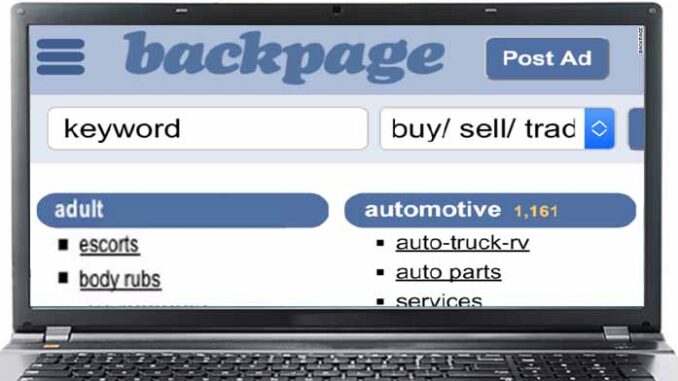
The former owners-publishers of Backpage.com, the Village Voice, Phoenix New Times, and other alternative-media platforms are scheduled to stand trial later this week on charges related to the publication of sex industry advertisements and money laundering.
Company founders Michael Lacey and Jim Larkin have now been the subject of a criminal investigation or prosecution for nearly eight years. They and other company executives and employees are set to stand trial Sept. 1. Their case also involves the seizure of millions of dollars in cash, real estate, and personal property from the defendants even though none have been convicted of any crime.
Backpage.com was a website for paid classified ads related to a variety of topics, from salons, daycare, auto repair, music lessons, roommates, dating, and “adult services.” It was revealed a few years ago that a federal grand jury first took a look at the company’s involvement with promoting prostitution and child sex trafficking back in 2013.
But the first serious salvo was not fired until October 2016 when then-California Attorney General Kamala Harris announced the arrest of Backpage CEO Carl Ferrer on felony charges of pimping, pimping a minor, and conspiracy to commit pimping for allegedly devising a way to create prostitution-related sites which “essentially serve as an escort directory” according to Harris.
At the same time, Harris criminally charged Michael Lacey and James Larkin, then the controlling shareholders of Backpage, with a felony for conspiracy to commit pimping, even though the men had not held managerial positions since 2014. In 2016, Backpage had sites for more than 30 cities in California, where company revenues totaled more than $51 million. from its California assets.
“Raking in millions of dollars from the trafficking and exploitation of vulnerable victims is outrageous, despicable and illegal,” Harris said at the time. “Backpage and its executives purposefully and unlawfully designed Backpage to be the world’s top online brothel.”
Within weeks, a California judge dismissed the charges against Ferrer, Lacey, and Larkin, ruling the three men did not cause prostitution to occur. The judge also pointed to the Communications of Decency Act of 1996, specifically Section 230, which shields publishers for ads and other content from third-parties.
“Congress has precluded liability for online publishers for the action of publishing third party speech and thus provided for both a foreclosure from prosecution and an affirmative defense at trial,” the judge wrote in early December 2016. “Congress has spoken on this matter and it is for Congress, not this Court, to revisit.”
But just days later, Harris refiled criminal charges at the end of 2016, adding dozens of money laundering allegations to the prostitution charges. And in April 2017, a more expansive investigation into multiple Backpage employees was presented to federal prosecutors based in Arizona.
In 2017, Ferrer ordered an end to the Backpage.com adult section. He also pleaded guilty to one count of money laundering and one count of conspiring to facilitate prostitution in a California court. The entire Backpage operation was shuttered in April 2018, about the same time a federal grand jury in Phoenix handed down multiple indictments against seven defendants.
Company executives have continually insisted they acted as merely a publisher, and thus were immune from liability under the Communications of Decency Act of 1996, specifically Section 230. Federal prosecutors, however, argue numerous company employees were involved in more than simply publishing ads provided by a third-party, and that the alleged criminal activities have nothing to do with Section 230.
Dan Hyer was a Backpage.com sales and marketing director who was among those indicted. He pleaded guilty in mid-2018 to conspiring to facilitate prostitution, and his plea agreement includes an admission that Hyer participated in a scheme to attract prostitutes to run adult services advertisements.
More than three years later, six remaining federal defendants are set to start trial Sept. 1 at the U.S. Courthouse in Phoenix. Those defendants are Lacey and Larkin; Scott Spear, VP; John Brunst, CFO; Andrew Padilla, operations manager; and Joye Jaala Vaught, an assistant operations manager.
The last few weeks Judge Susan M. Brnovich and the attorneys have been reviewing jury questionnaires from more than 2,000 prospective jurors in an effort to speed up jury selection.
Judge Brnovich has ordered all the parties -including attorneys, paralegals, assistants, and the defendants- take a COVID-19 test on Monday, Aug. 30 and provide proof to the court prior to the start of trial on Wednesday morning.
Earlier this year the judge declined to recuse herself from the case based on disparaging comments repeatedly made about the defendants by her husband, Arizona Attorney General Mark Brnovich. The U.S. Ninth Circuit Court of Appeals ruled last month Judge Brnovich was not required to step away from the case, after which she confirmed the trial would start in September.
One of the main questions will be whether the Backpage.com defendants are criminally liable for supporting prosecution and money laundering not only for publishing the ads, but also for the company’s involvement with advertisers in creating ads and promotions.
Prosecutors contend many of the ads were written with input from Backpage employees.
Backpage.com was based in Dallas but had offices in multiple cities. The company pleaded guilty to a human trafficking charge in Texas and admitted to conspiracy to commit money laundering in Arizona.
A jury verdict that weakens the Section 230 veil is expected to have serious consequences for companies like Facebook, Google, Instagram, and Twitter as all allow publication of third-party content.
